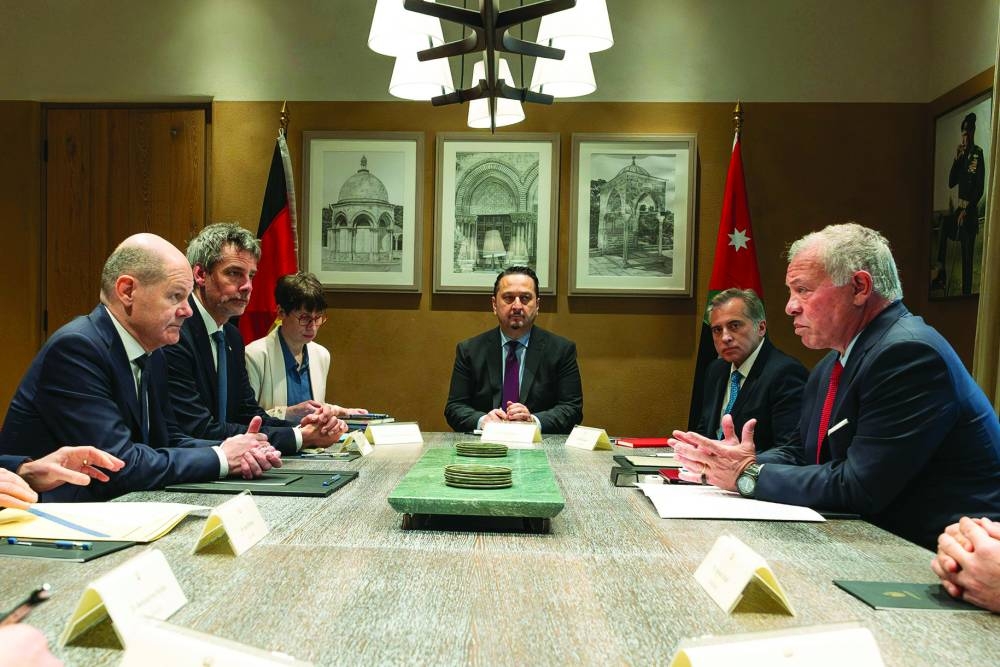German Chancellor Olaf Scholz yesterday called for a deal to free hostages held in war-ravaged Gaza accompanied by a “longer-lasting ceasefire”, as warring parties geared up for more talks.
“We need a hostage deal with a longer-lasting ceasefire,” Scholz said during a joint press appearance in Jerusalem with Israeli Prime Minister Benjamin Netanyahu. “We understand the hostage families who say after more than five months, ‘The time has come for a comprehensive hostage deal for saving those who are still captive.’”
Scholz’s visit came the same day Israeli officials were set to meet to discuss the “mandate” of a negotiations team expected to participate in a new round of talks in Qatar aimed at securing a new truce between Israel and Hamas.
Netanyahu is under intense domestic political pressure to free hostages seized during Hamas’s unprecedented October first week storming of southern Israel, which started the Gaza war now in its sixth month.
Israeli’s retaliatory military campaign to eliminate Hamas has killed at least 31,645 people, mostly women and children, according to the health ministry in Hamas-run Gaza.
In Jerusalem yesterday, Scholz called for a “negotiated two-state solution” to the Israeli-Palestinian conflict, saying “terror cannot be defeated with military means alone”. Earlier, Netanyahu said Israeli troops would pursue a planned ground offensive in southern Gaza’s Rafah that has spurred fears of mass civilian casualties, given that the majority of Gazans have sought refuge there.
Scholz voiced concern about what the offensive would mean for civilians. “The military logic is one consideration, but there is a humanitarian logic as well. How should more than 1.5mn people be protected? Where should they go?”
ASSAULT WILL MAKE
PEACE ‘VERY DIFFICULT’
The large number of civilian casualties that would result from an Israeli assault on the Gaza city of Rafah would make regional peace “very difficult”, German Chancellor Olaf Scholz said yesterday after talks with Jordanian King Abdullah, Reuters reported from Aqaba.
“Right now, it is about ensuring we come to a long-lasting ceasefire,” Scholz said after talks with Abdullah at his private residence in the Jordanian Red Sea port of Aqaba.
“That would enable us to prevent such a ground offensive from taking place.”
Asked if he was prepared to exert pressure on Netanyahu to stop such an assault, Scholz said it was “very clear we must do everything so the situation does not get worse than it already is.” “Israel has every right to protect itself.. At the same time, it cannot be that those in Gaza who fled to Rafah are directly threatened by whatever military actions and operations are undertaken there.”
Israel says Rafah is one of the last strongholds of Hamas, which it has pledged to eliminate, and that residents will be evacuated.
Scholz did not directly answer a question about whether Germany would react to a large-scale Rafah offensive, for example by restricting German weapons exports to Israel.
Germany has been one of Israel’s staunchest allies alongside the US, consistently supporting its right to defend itself, underscoring its duty to stand by the country’s side in atonement for its perpetration of the Nazi Holocaust.
But the government has faced accusations — including from prominent Jewish residents in Germany — of allowing guilt to blinker its response to Israel’s retaliation.
Malaysian Prime Minister Anwar Ibrahim accused Europe during a visit to Berlin last week of being “hypocritical” and selective in its concern for different peoples, overlooking decades of widespread Palestinian suffering. Still, German government officials have stressed in recent months the need for Israel to adhere to international law in its response to the Hamas attacks and called upon Israel to allow more humanitarian aid into Gaza. They have also denounced the violence of Jewish settlers in the West Bank.
Scholz said the talks with King Abdullah had made clear once again how important it was for all negotiations to touch on the long-term prospects for a possible peaceful co-existence between Israel and a Palestinian state.

A handout picture released by the Jordanian Royal Palace yesterday, shows Jordan’s King Abdullah II meeting with German Chancellor Olaf Scholz (left) in Amman, during his visit to the region.
